“What I hear, I keep “
Adinkra are the distinct and instantly recognisable motifs and symbols used in Ghanaian culture particularly by the Akan people. They are commonly seen in fabric but also used on pottery, furniture, in architecture and so on. Though extremely beautiful and decorative, each symbol represents various messages, proverbs and concepts.
A brief history
Adinkra cotton cloth was originally produced by the Gyaaman clans of the Brong region and was worn only by royalty and spiritual leaders and used for important ceremonies such as funerals and weddings. Traditionally, adinkra aduru a special ink was used in the printing process. Apparently this is produced by boiling, soaking and beating the bark from the Badie tree. The symbols where then applied to handwoven fabric using stamps. The creation of this type of cloth is believed to have begun as far back as the 17th century. Beautiful!
There is a great website that catalogues all the symbols with their associated meanings. http://www.adinkra.org
The site’s mission is to make available high-quality renditions of these African symbols at no cost for personal and non-profit uses. The site was designed to be user-friendly in Africa and anywhere else where slow and erratic internet connections can be a problem.
Please show them some love! There is a wealth of knowledge there.
I am completely and utterly in love with the history, ideas and stories embodied in these symbols. They are a simple and bold representation of history and sometimes complex concepts steeped in the tradition. The bold graphic nature of the motifs also appeal to me. Below are some of my favourites (I lie…I love them all).
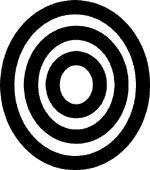
ADINKRAHENE “Chief of the adinkra symbols” symbol of greatness, charisma and leadership This symbol is said to have played an inspiring role in the designing of other symbols. it signifies the importance of playing a leadership role.
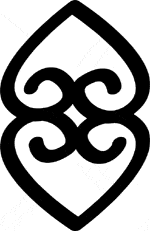
ASASE YE DURU “the Earth has weight” symbol of providence and the divinity of Mother Earth This symbol represents the importance of the Earth in sustaining life.
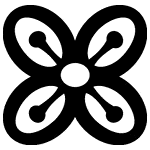
BESE SAKA “sack of cola nuts” symbol of affluence, power, abundance, plenty, togetherness and unity The cola nut played an important role in the economic life of Ghana. A widely-used cash crop, it is closely associated with affluence and abundance. This symbol also represents the role of agriculture and trade in bringing peoples together.
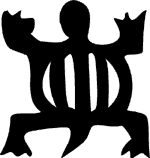
DENKYEM “crocodile” symbol of adaptability The crocodile lives in the water, yet breathes the air, demonstrating an ability to adapt to circumstances.
DUAFE “wooden comb” symbol of beauty and cleanliness; symbols of desirable feminine qualities The duafe was a prized possession of the Akan woman, used to comb and plait her hair and embodies abstract qualities of feminine goodness, love and care, looking one’s best and good hygiene.


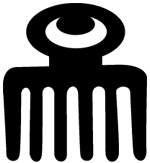
Your stuff here is totally unique I have bought cushions scarves and a snood. This is so amazing reselling on trend.
Thanks and well done.